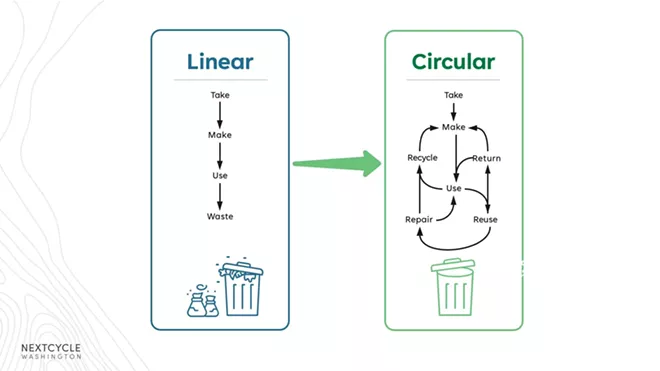
Washington is looking for the next group of sustainable small businesses and nonprofits to participate in NextCycle, the state's accelerator program that helps new waste reduction efforts get private-sector funding.
"NextCycle started in Michigan and Colorado and then came to Washington two years ago," says Tina Schaefer, an environmental planner with the state Department of Ecology, which runs NextCycle locally. "Its focus is to support the growth of local social enterprises, businesses and nonprofits that have developed solutions to improve our economy, moving it from the traditional linear to the circular."
Circular systems focus on the reuse of goods and materials, whereas traditional linear models typically see products made, packaged, sold, used, and then thrown away.
Up to 10 teams will be selected to go through this year's 6-month NextCycle accelerator academy, where they'll be paired with mentors and work one-on-one with consultants to develop their pitches. In late August or early September, they'll present their ideas at a pitch showcase where private investors could choose to help them take their projects to the next level.
Last year's cohort of 14 teams ended up getting $13.5 million in investments for projects that ranged from developing a new glass recycling hub for Eastern and Central Washington to creating insect-based pet food. Other teams produced new products from retired fire hoses (while creating employment for refugees), created a hyperlocal network to compost restaurant food waste, enabled coffee shops to share reusable to-go cups with their customers and more.
Applications are due by Jan. 26.
Before then, the team of consultants hired by Ecology will host an informational "application party" from 5 pm to 6:30 pm on Jan. 11, where anyone who is interested can learn more about the process, ask questions about the application, and talk to previous participants, Schaefer says. You can register for the virtual application party here.
"If you think you have an idea, there’s no cost besides time," Schaefer says. "I just encourage everyone to apply because it’s fun, it’s worthwhile, and there are the benefits of making those connections and watching your business grow."
Last year's program was run as a partnership between King County and the state, but with Ecology solely in charge this year, the hope is to bring out innovators from all across the state, particularly from underrepresented communities, Schaefer says.
"We’re hitting the pavement," she says. "We want to see everybody get a chance, where in other programs they may not get a chance."
Many FAQs can be found on the website, including who should apply.
According to NextCycle, to be eligible:
- Projects must either utilize materials that are otherwise disposed of, provide a higher better use of materials, or focus on waste prevention.
- Project leads do not need to be headquartered in Washington at the time of application, but to be accepted, the project or business idea must be implemented and based in Washington.
- Projects must show the potential to be financially sustainable.
- Projects must consider social equity and community impacts, especially with respect to overburdened communities.
- Projects must consider GHG reduction potential.
- Projects must demonstrate a measurable and/or scalable impact to Washington’s waste diversion/zero waste goals.
- Foundational research and feasibility studies are not eligible. Pilot projects may be considered eligible.

























